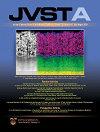硅钛改性中空硅混合溶胶制备具有自清洁功能的抗反射涂层
IF 2.1
3区 材料科学
Q3 MATERIALS SCIENCE, COATINGS & FILMS
引用次数: 0
摘要
采用溶胶-凝胶法制备了硅钛复合溶胶改性的混合溶胶,研究了硅钛复合溶胶与空心硅溶胶的混合比例对减反射涂层表面形貌、光学性能、力学性能和润湿性能的影响。此外,通过在玻璃基板上浸涂改性溶胶,考察了改性溶胶的自清洁能力和环境稳定性。在380 ~ 1100 nm波长范围内,ARC的总太阳加权透过率(Тsw)大于94.97%,显著高于裸玻璃基板(Тsw = 90.62%)。改性后的ARC硬度达到3 h,涂层具有极亲水性,最小水接触角小于5°。水滴在ARC表面形成水膜,可显著降低后续污染物对涂层透光率的不利影响;同时,由于TiO2的引入,涂层可以氧化分解有机污染物。最后,阻尼试验结果表明,电弧透过率仅下降0.05%,环境稳定性良好。本文章由计算机程序翻译,如有差异,请以英文原文为准。
Fabrication of antireflective coatings with self-cleaning function using Si–Ti modified hollow silicon mixed sol
The antireflective coating (ARC) is fabricated by the sol-gel method using mixed sol modified by Si–Ti composite sol. The effects of the mixing ratio of Si–Ti composite sol and hollow silica sol on the surface morphology, optical properties, mechanical properties, and wetting ability of the ARC were studied. Moreover, the self-cleaning ability and environmental stability were examined via dip coating the modified sol on glass substrates. The proposed ARC exhibited a total solar-weighted transmittance (Тsw) of more than 94.97% over a wavelength range of 380–1100 nm, significantly higher than that of the bare glass substrate (Тsw = 90.62%). After modification, the proposed ARC exhibited a hardness of 3 H. In addition, the coating presented an extremely hydrophilic surface with a minimum water contact angle of less than 5°. Water droplets resulted in the formation of a water film on the ARC surface, which could significantly reduce the adverse effects of subsequent pollutants on the coating transmittance; simultaneously, owing to the introduction of TiO2, the coating could oxidatively decompose organic contamination. Finally, damp test results showed that the ARC transmittance only decreased by 0.05%, indicating good environmental stability.
求助全文
通过发布文献求助,成功后即可免费获取论文全文。
去求助
来源期刊

Journal of Vacuum Science & Technology A
工程技术-材料科学:膜
CiteScore
5.10
自引率
10.30%
发文量
247
审稿时长
2.1 months
期刊介绍:
Journal of Vacuum Science & Technology A publishes reports of original research, letters, and review articles that focus on fundamental scientific understanding of interfaces, surfaces, plasmas and thin films and on using this understanding to advance the state-of-the-art in various technological applications.
 求助内容:
求助内容: 应助结果提醒方式:
应助结果提醒方式:


